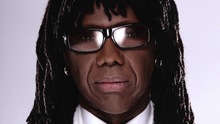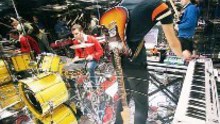But this isn’t really doing for the kids. It’s about publicity. It’s about being the most sought after ticket in town. It’s about supply and demand - and the easiest way to create demand is to artificially limit supply. Somehow it’s doubtful that the fact that the tickets sold out in four minutes over the internet is really going to make people more aware of the Cancer Trust, or Oxfam. What it means is that money that should’ve gone to charity sits in the back-pockets of ticket touts and E-bay accounts whilst the charity recieves just a fraction.
Take some of the biggest acts in the UK : U2, REM, Oasis, Madonna and the Manic Street Preachers. Each has previously played the stadia of the world - there were 2.5million applications for Knebworth tickets for Oasis, and probably about the same number for U2’s recent ‘intimate’ tour. In some misguided attempt, they have all downgraded to venues far smaller than their size for their most recent jaunts around the UK.
In February, U2 - who sold 144,000 tickets for a weekend at Wembley on their 1997 tour, and 288,000 for their 1993 tour, decided that London would be serviced by a ‘secret’ one-off date at the 1,800 capacity Astoria and then a 20,000 capacity show at Earl’s Court. Who benefits? Not the fans for sure. Most of their fans spent all morning trying to book tickets on the internet and failing. Those who absolutely must go have a few options - pay a tout through the nose, win them in E-bay auctions (a pair of Radiohead tickets recently sold for £5,000) , or go without. So much for doing it for the fans.
Even if all the dates sell out there’s still a chance of getting ‘rare as gold dust’ tickets in radio competitions and internet scams.
And of course, since megastars like U2 don’t completely slum it - hey, who wants to give up the benefits of a private jet? - tickets prices have to go up. In 1997, tickets for the U2 “PopMart” tour came in at about £27. In the UK even the average U2 ticket was around £45. Plus fees. In the US, they had the pleasure of average tickets being £93.
On the other hand, U2 could just have gone and played somewhere a little bit bigger. A lot more people could’ve seen them. And paid a lot less for the pleasure. And Bono would still fly in his precious little plane. But the fans wouldn’t be standing outside wondering why U2 don’t want people to see them. And the Internet wouldn’t be awash with rumours and people desperately trying to but tickets.
In these cases, the winners are ticket touts and scamsters. The losers are fans and the charities.
Recent dates by the Manics, Stereophonics, and Oasis meanwhile have been specifically geared at charity fund-raising events. Surely, if a band is donating a night of its life to make money for charity, then isn’t it therefore counterproductive to play small venues and reduce the revenue the charity makes? Why not headline Wembley, charge £25 a ticket and make the charity between 10 and 160 times as much?
But then, that wouldn’t be so cool would it? And it wouldn’t be the “most sought after ticket in the country”? And they wouldn’t be doing it for the fans would they? Oh no. Though quite how doing it “for the fans” equates with ensuring that fans either can’t get hold of, or can’t afford tickets is a mystery. Isn’t capitalism wonderful?















